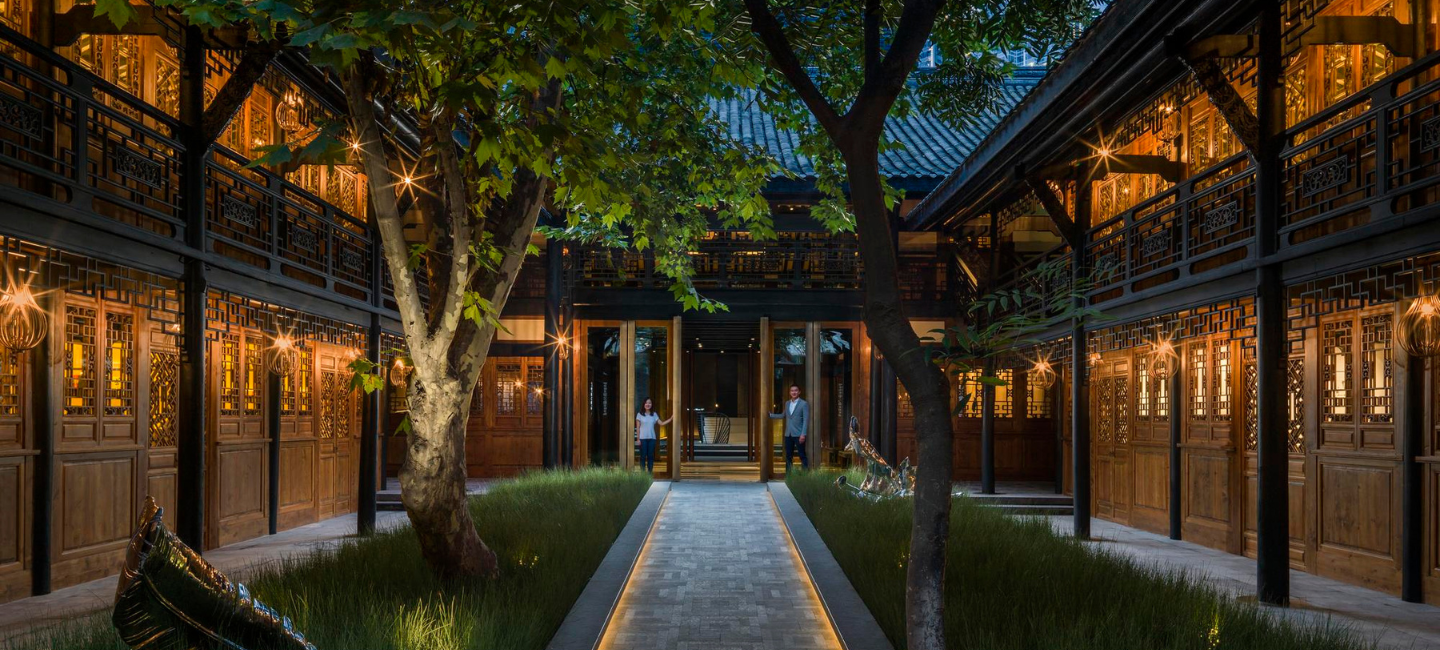Nestled amidst Chengdu, China, The Temple House stands as a beacon of architectural brilliance and contemporary luxury. With a history deeply rooted in a 1,000-year-old complex that once housed the renowned Daci Temple, this hotel seamlessly blends tradition with modernity, creating an immersive experience for guests. From its restored Qing Dynasty facade to its interiors and architectural marvels, The Temple House offers a journey through history and culture, inviting visitors to indulge in the finest hospitality while experiencing the rich heritage of the region.

With its rich history, meticulous design, and unparalleled hospitality, The Temple House continues to captivate and inspire travellers worldwide, offering a glimpse into the soul of Chengdu and the timeless allure of Chinese culture. Whether indulging in a rejuvenating spa treatment, lounging by the poolside, or savouring a culinary masterpiece, guests are invited to immerse themselves in the beauty and elegance of The Temple House, where every moment is a celebration of design, luxury, and the art of hospitality. As we delve deeper into the architectural and interior design elements of The Temple House, it’s essential to understand the historical significance of its location and the cultural context that shapes its identity. Chengdu, the capital of Sichuan Province in southwestern China, is renowned for its rich history, vibrant culture, and stunning natural landscapes. The city’s historical roots date back thousands of years, making it one of the oldest continuously inhabited cities in the world.
Against this backdrop of historical richness and cultural diversity, The Temple House emerges as a symbol of architectural innovation and design excellence. Located in the heart of Chengdu’s bustling Jinjiang District, the hotel occupies a prime position within the historic Daci Temple complex, a 1,000-year-old heritage site that once served as one of China’s most renowned monasteries. The preservation and adaptive reuse of this historic complex are central to the hotel’s design ethos, reflecting a deep respect for Chengdu’s cultural heritage and architectural legacy.

The architectural design of The Temple House is a harmonious blend of tradition and modernity, seamlessly integrating ancient architectural elements with contemporary aesthetics. The hotel’s facade, with its restored Qing Dynasty buildings and grey-bricked entrance, pays homage to the architectural styles of the past while embodying a sense of timeless elegance and sophistication. As guests enter the hotel, they are greeted by a meticulously designed courtyard that serves as the focal point of the property. Inspired by the traditional gardens of Sichuan, this verdant oasis features lush greenery, water features, and carefully curated landscaping, creating a serene and welcoming ambience that transports guests to a bygone era of contemplation.

The interior design of The Temple House is equally impressive, with each space meticulously curated to create a sense of luxury, comfort, and refinement. The guest rooms, designed as urban sanctuaries, feature spacious layouts, contemporary furnishings, and an earthy colour palette that exudes a sense of warmth. Natural materials such as wood, stone, and bamboo are used throughout the hotel, adding a touch of authenticity and sophistication to the overall design. Technological innovations abound, with state-of-the-art amenities and entertainment systems seamlessly integrated into the room’s design, ensuring that guests enjoy the utmost comfort and convenience during their stay.
The Mi Xun Spa, located within the hotel’s courtyard, is a testament to the hotel’s commitment to wellness and relaxation. Designed as a sanctuary of rejuvenation, the spa offers a range of luxurious treatments inspired by traditional Chinese healing practices, using the finest organic products and natural ingredients to nourish the body, mind, and soul. The spa’s interior design reflects a minimalist aesthetic, with clean lines, muted colours, and soft lighting creating a serene space that promotes relaxation and inner harmony. Guests are invited to indulge in a range of pampering experiences, from rejuvenating massages to revitalizing facials, amidst an atmosphere of pure bliss and serenity.

Central to The Temple House’s architectural narrative is its sprawling courtyard oasis, inspired by the picturesque rice terraces of Sichuan. This verdant expanse serves as more than just a visual delight; it encompasses the hotel’s meeting rooms, gym, and awe-inspiring sky-lit indoor pool. Bathed in natural light, the pool becomes a focal point of architectural marvel, inviting guests to immerse themselves in its azure depths while enjoying panoramic views of the surrounding landscape. The design ethos of the courtyard reflects a delicate balance between form and function, seamlessly integrating modern amenities with timeless landscapes to create a visually stunning and highly functional space.
The culinary offerings at The Temple House are a celebration of design and gastronomy, with each dining outlet offering a unique culinary experience. From the art deco-inspired ambience of Jing Bar to the vegetarian delights of Mi Xun Teahouse, every restaurant reflects a commitment to culinary excellence and innovation. Designed by renowned international firm AvroKO, the restaurants exude an air of timeless elegance, meticulous attention to detail and a nod to Shanghai’s golden era. Guests are invited to indulge in a culinary journey, where each dish is a masterpiece crafted with locally sourced ingredients and infused with culinary creativity.

The Temple House stands as a shining example of architectural brilliance and design excellence in Chengdu. From its historical roots to its contemporary allure, every aspect of the hotel tells a story of cultural richness and artistic ingenuity. As guests immerse themselves in the courtyards, luxuriate in the spa’s serene ambience, and savour culinary delights, they become part of a timeless narrative—a symphony of design and hospitality that transcends boundaries and captivates the senses. In The Temple House, tradition meets modernity, creating an unforgettable experience that lingers long after the journey ends.
Image Credits: The Temple House


